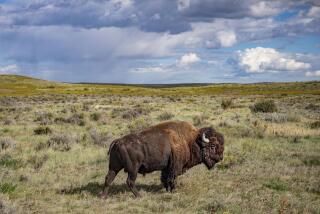Movie review: ‘Summer Pasture’
Winds, rain and straying yak are only some of the hardships in the remote and harshly beautiful Sichuan province grasslands where Tibetan nomads toil for their livelihood, but as Lynn True and Nelson Walker’s humanely observed documentary “Summer Pasture” hints, it’s the pull of modernity that most threatens their traditions.
The film is on the one hand a graceful record of a primitive calling — featured husband and wife Locho and Yama are in a near-constant state of tethering, milking, dung-drying for fire, cooking and rope-making, on top of caring for their infant daughter and wryly bickering in their crowded tent. But the movie is also a bittersweet look at hard choices ahead, as their kind have become more and more drawn to the conveniences of town life in the wake of increasingly strict government rules.
“It’s not good to do nothing,” hardworking Yama says at one point, indicating an entrenched position, while Locho — who likes to reminisce about his ladies’ man days and frequently checks his skin in a mirror — gets a wistful sound in his voice when he talks of his illiteracy: “I think I missed out.”
Visually strengthened by fire-lit scenes of family closeness that feel like huddled moments against unseen forces, “Summer Pasture” has an earthy intimacy and compassion for its subjects that will have you thinking about their plight long after they’ve packed up and moved on for winter.
“Summer Pasture.” No MPAA rating. Running time: 1 hour, 25 minutes. At Laemmle’s Music Hall 3, Beverly Hills.
More to Read
The biggest entertainment stories
Get our big stories about Hollywood, film, television, music, arts, culture and more right in your inbox as soon as they publish.
You may occasionally receive promotional content from the Los Angeles Times.










